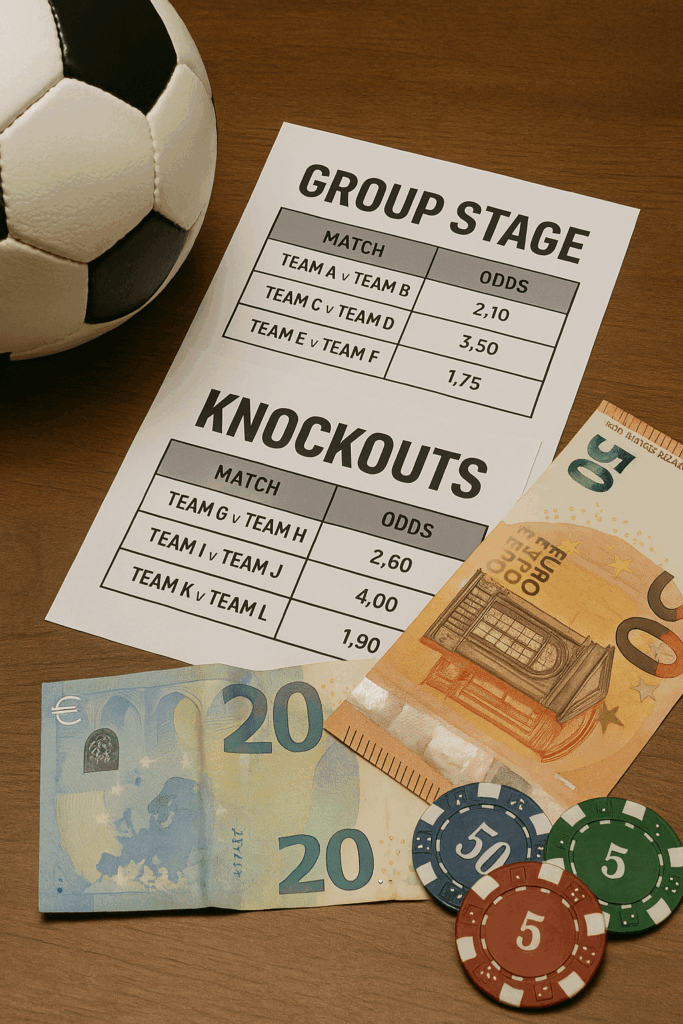
Champions League – The King of European Football and a Challenge for Bettors
Few sporting events capture the imagination and excitement of fans quite like the Champions League. As the most prestigious club competition in Europe, it brings together elite teams, world-class talent, and unforgettable drama every season. But beyond the football spectacle, the Champions League also represents one of the most dynamic and unpredictable arenas for sports betting.
From the first kick in the group stage to the final whistle of the championship match, each round presents a unique betting environment. Unlike domestic leagues, where form and familiarity play a consistent role, the Champions League introduces fresh tactical matchups, contrasting football cultures, and intense pressure — all of which can heavily influence betting markets.
What makes Champions League betting especially intriguing is how dramatically the landscape changes between the group stage and the knockout rounds. The early rounds offer quantity — dozens of games packed into a few months, with more stable odds and chances to find value bets. The knockout stage, on the other hand, delivers tension, tactics, and volatility — where a single goal can shift the balance and send odds spinning.
For anyone serious about betting on football, understanding how to approach each phase differently is crucial. Let’s start with the group stage, where opportunity and unpredictability walk hand in hand.
How Champions League Group Stage Betting Works
The Champions League group stage runs from September to December and features 32 teams divided into 8 groups of four. Each team plays six matches — three home and three away — with the top two from each group advancing to the knockout stage.
From a betting perspective, this phase is full of potential. With 96 games in total, bettors can find a wide variety of markets, from traditional 1X2 bets (win/draw/lose) to more specialized options such as over/under goals, both teams to score, and player props.
However, betting success in the group stage depends on understanding motivation, rotation, and context. Not all matches carry the same importance. Some top teams secure qualification after just four games and start resting key players. This creates excellent opportunities for bettors who spot undervalued underdogs.
For instance, if Manchester City clinches qualification early, Pep Guardiola may rest players like Haaland or Foden. The market, however, might still price City as strong favorites based on reputation alone — opening the door for sharp bettors to back a draw or even an upset.
Another factor is fixture congestion. Teams competing in their domestic leagues and the Champions League simultaneously must rotate their squads, often resulting in unpredictable outcomes. Clubs from smaller leagues, on the other hand, may treat the Champions League as their top priority and field full-strength lineups every match.
Statistically, the group stage also sees more goals per game compared to the knockouts. Teams tend to play more open, attacking football, especially early in the competition when there’s less to lose. This makes over 2.5 goals or both teams to score popular and often profitable betting choices.
Key Factors to Watch When Betting on the Group Stage
If you want to make consistent profits during the Champions League group phase, you need to look beyond club names and pay attention to situational factors that often decide outcomes.
1. Form matters more than reputation
Public perception often overvalues big clubs like Real Madrid, Bayern Munich, or PSG. However, if a team is struggling domestically or lacking motivation, odds can become inflated. Smart bettors look for value bets in lesser-known matches where the public isn’t paying attention.
2. Motivation is everything
By matchday five or six, motivation levels differ dramatically. A team that has already qualified may lack intensity, while another fighting for second place will play with urgency. These scenarios often lead to goal-heavy games or surprise results.
3. Home advantage remains crucial
Champions League nights at stadiums like Turk Telekom Arena (Galatasaray) or Marakana (Red Star Belgrade) are famously intimidating. Teams from Eastern Europe or Turkey often overperform at home, especially against bigger clubs that underestimate the atmosphere.
4. Watch the market movement
Odds in Champions League games react quickly to team news, injuries, and lineups. Early bettors who anticipate these changes can catch excellent prices before the market corrects itself.
5. Goal difference can be a hidden clue
Unlike knockout rounds, goal difference can decide who advances. This means teams are more likely to push for additional goals even when leading comfortably. Late goals are common, making “over goals” and “second-half scoring” valuable markets to explore.
Champions League Knockout Betting – A Different Kind of Game
Once the Champions League group stage ends, the betting landscape transforms completely. The knockout rounds introduce a new level of tension, strategy, and unpredictability that makes this phase both thrilling and challenging for bettors.
From the Round of 16 onwards, every mistake can be fatal. The format — two-legged ties (home and away), followed by single-match semifinals and the final — changes not only the teams’ tactical approach but also how bookmakers set their odds.
Different motivations, different markets
In the knockout stage, motivation is no longer a variable — it’s guaranteed. Every team gives maximum effort, and matches often become tight and tactical. The number of goals typically decreases compared to the group stage, as teams prioritize not conceding rather than scoring freely.
This naturally affects betting markets. For example:
- Under 2.5 goals becomes a more frequent outcome.
- Draws at halftime are common, as teams approach the first leg cautiously.
- Correct score and double chance markets offer better value when analyzing tactical matchups.
Also, the home advantage often becomes amplified in the second leg, especially when a team plays in front of passionate fans knowing exactly what result they need to qualify. Historically, data shows that roughly 60% of teams playing the second leg at home progress to the next round, which is useful information for bettors evaluating outright markets.
Live Betting and Momentum in Knockout Games
Live (in-play) betting reaches its peak during the Champions League knockout rounds. Because every goal or red card can drastically shift qualification probabilities, odds move faster than in any other football market.
Consider a typical Round of 16 tie between PSG and Bayern Munich. If Bayern scores early in the first leg, the live odds on PSG qualifying may double instantly — yet smart bettors know there’s still 150+ minutes of football left, plus potential extra time and penalties. Understanding momentum and game flow is key to exploiting these temporary inefficiencies.
What to monitor during live betting:
- Game tempo and tactical changes
If one team suddenly switches from a 4-3-3 to a defensive 5-4-1 setup after scoring, the tempo will likely slow down — a good time to bet on “under goals.” - Injuries and substitutions
The loss of a key defender or creative midfielder can shift control. Markets often take a few minutes to adjust, giving fast bettors an edge. - Psychological pressure
Knockout football is full of tension. Teams leading by one goal may panic under pressure, while underdogs often play with nothing to lose. Recognizing those psychological swings in real time can be the difference between winning and losing a live bet. - Second-leg scenarios
The return leg creates unique betting angles. For example, teams losing by multiple goals in the first leg often attack relentlessly early in the second, increasing chances for early goals and corner bets.
Extra time and penalties
Another key difference in knockout betting is the potential for extra time and penalty shootouts. When betting on match outcomes, always check if your bet includes extra time (“to qualify”) or ends after 90 minutes (“regular time only”).
Markets like “to qualify” and “lift the trophy” can sometimes be safer long-term investments, especially when betting on evenly matched teams.
Group Stage vs Knockouts – The Key Betting Differences
The table below summarizes how betting dynamics change between the two phases of the Champions League, and how smart bettors can adjust their approach.
| Aspect | Group Stage | Knockout Stage |
|---|---|---|
| Number of Matches | 96 games | 29 games |
| Style of Play | Open, attacking | Tactical, cautious |
| Average Goals per Game | 3.0 | 2.4 |
| Motivation Levels | Variable | Maximum |
| Market Volatility | Stable | Highly reactive |
| Best Betting Markets | Over goals, both teams to score, underdog value | Under goals, to qualify, live betting |
| Psychological Factors | Lower stakes | Extreme pressure and tension |
| Predictability | Easier to model | More influenced by emotions and strategy |
As the table shows, betting during the group stage is about volume and pattern recognition, while knockout betting requires timing, discipline, and psychological insight.
During the group stage, consistent analytical betting can yield steady returns. But in knockouts, bettors must adapt — watching games live, reacting to tactical shifts, and understanding the context of two-legged ties.
Example: Value in Knockout Betting
Imagine a quarterfinal tie between Real Madrid and Napoli. The first leg ends 1–1 in Naples. Bookmakers might price Real Madrid at 1.60 to qualify and Napoli at 2.40.
However, if Napoli scores first in Madrid, those odds flip dramatically in-play — and that’s where experienced live bettors can find edge.
Similarly, betting on “extra time yes” or “penalty shootout” in tightly contested matchups (like Inter vs Atletico Madrid) often offers excellent odds, given how frequently knockout ties are decided by fine margins.
When not to bet
It’s just as important to know when to skip a bet as it is to place one. In knockout rounds, markets can overreact to recent form or public narratives — for instance, overhyping a team that just pulled off a big upset.
If odds don’t offer value, or if a match looks unpredictable, staying out is a winning move in the long run.
Best Strategies for Champions League Betting
Betting on the Champions League is as complex as it is exciting. With so many elite clubs, tactical nuances, and unpredictable outcomes, it’s easy to get caught up in the hype. But the most successful bettors don’t rely on luck — they use structure, research, and discipline.
Below are some of the most effective strategies to apply across both the group stage and knockout rounds.
1. Combine Data and Context
Statistics are crucial, but numbers alone don’t tell the whole story. For example, a team’s recent win streak might look impressive, but if those wins came against weaker domestic opponents, it doesn’t necessarily translate to success in the Champions League. Always combine data with situational awareness — travel fatigue, injuries, and fixture congestion can all tilt the odds.
2. Bet Early, But Not Too Early
In the group stage, markets open weeks in advance. Early bettors can exploit mispriced odds before lineups and news adjust the market. However, in the knockout rounds, waiting for official team sheets can be smarter — especially if managers are expected to rotate players or adjust tactics.
3. Look for Value, Not Emotion
The Champions League is full of emotional narratives — underdogs, comebacks, rivalries. Bookmakers know this and often adjust odds based on public sentiment. Sharp bettors avoid following the crowd. If 80% of bets are on a big favorite, it might be time to explore the opposing market or alternative bets like “draw no bet” or “under 2.5 goals.”
4. Specialize in One Market
Instead of trying to bet on everything, focus on a specific market you understand deeply — for instance, over/under goals, first-half results, or Asian handicaps. The Champions League is one of the most analyzed competitions in the world, so finding an edge means becoming an expert in a narrow field.
5. Track Motivation and Rotation
In the group stage, motivation fluctuates. In the knockout rounds, fatigue and pressure dominate. Keeping track of lineups, press conferences, and travel schedules helps you anticipate performance dips before the odds reflect them. Following reliable sources like UEFA.com ensures accurate and up-to-date information.
6. Live Betting Discipline
In-play betting during Champions League nights can be thrilling, but emotional decisions lead to losses. Have a pre-defined plan: if the match goes as expected (for example, an early goal from the favorite), decide in advance whether to hedge, double down, or exit the market. Discipline turns chaos into opportunity.
7. Manage Your Bankroll Like a Pro
Even the best strategies fail without proper bankroll management. Set aside a fixed portion of your funds for Champions League betting and never risk more than 2–3% on a single wager. This prevents emotional tilt and ensures long-term sustainability, even through unlucky streaks.
Conclusion: How to Maximize Champions League Betting Potential
The Champions League represents the pinnacle of European football — and also the peak of betting complexity. The group stage rewards consistency, data analysis, and spotting mispriced odds, while the knockout rounds demand patience, timing, and the ability to read psychological momentum.
No single strategy guarantees success, but adapting your approach between these two phases can make a huge difference. In the group stage, look for volume and value; in the knockouts, look for discipline and context.
Ultimately, successful Champions League betting is about staying rational in an emotional environment. With preparation, research, and proper bankroll management, you can enjoy the competition not only as a fan but also as an informed and confident bettor.
FAQ – Frequently Asked Questions
1. Is it easier to profit during the group stage or knockout rounds?
Generally, the group stage offers more opportunities for consistent value bets because of the number of matches and variable motivation. Knockout rounds can be profitable, but volatility and emotional betting make them riskier.
2. How can I find value bets in the Champions League?
Focus on matches where public perception doesn’t match reality — for example, when a “big club” fields a weakened lineup or faces a motivated underdog. Analyze form, team news, and motivation before placing a wager.
3. Does live betting offer an advantage?
Yes, especially in knockout games. Live betting allows you to react to momentum swings and tactical shifts. However, it requires quick decisions and discipline to avoid impulsive losses.
4. Which factors influence Champions League odds the most?
Injuries, rotation, travel distance, weather, and fixture congestion all impact odds. Public sentiment and media hype also cause shifts, particularly around high-profile matches.
5. What’s the best way to manage risk during Champions League betting?
Stick to a budget, diversify your bets, and avoid chasing losses. Use smaller stakes for riskier bets and larger stakes only on high-confidence selections.



